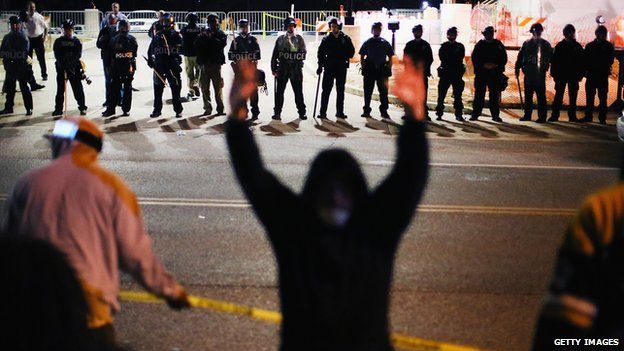Grand jury decision could reignite Ferguson unrest
- Published
- comments

The US public's mind is fickle, its attention span short.
While the shooting of an unarmed black teenager in Ferguson, Missouri, seemed the sole focus of US cultural and political discussions in August, American life goes on, and new concerns and distractions emerge.
The Islamic State, domestic abuse in the National Football League, Ebola and mid-term elections. While the people of Ferguson may remember - and earlier this month town residents renewed demonstrations following the shooting of another black teenager in the area - the US public seemed willing to forget.
The story moved off the front pages, then out of the news entirely and into the pile of other discarded outrages, like incompetent Veterans Administration hospitals and Taliban prisoner-of-war Bowe Bergdahl.
This should not be surprising, of course. The depths of concern are not limitless. Only so much ink can be spilled, tears shed and fists waved before it's time to move on. That, for better or worse, is human nature.
Every so often, however, there's a little flicker among the story's ashes, a sign that the fires that burned in Ferguson aren't extinguished - that the issues of race and poverty, police militarisation and societal cohesion are not gone but merely dormant.
Such was the case earlier this week, as the Washington Post and the St Louis Post-Dispatch reported on evidence being considered by a grand jury investigating whether charges should be brought against Ferguson police officer Darren Wilson for shooting Michael Brown.
Sealed court documents leaked to the press included Brown's official autopsy, physical evidence and testimony from multiple witnesses that appear to back up Mr Wilson's account that he fired on Brown in self defence.
For instance, the medical examiner reported that bullet wounds in Brown's body seem to indicate that his arms were not raised in a gesture of surrender. Gunpowder on his hands could show that he was reaching for Mr Wilson's weapon. A test of Brown's blood revealed he had consumed enough marijuana to possibly trigger hallucinations.
The news has some conservative commentators saying: "I told you so".
Breitbart's John Sexton writes that while the leaks may be illegal, "after two months in which the agitators with the loudest voices have been telling mostly one side of this incident, they may be a public service".
"It wasn't so long ago that Ferguson, Missouri, was supposed to be an American morality tale of racism, the militarisation of police and all manner of other evil," says the National Review's Rich Lowry.
Now, he writes, the "story of a cold-blooded execution by cop seems even more unlikely".
Syndicated columnist Mona Charen says Brown is just another fake civil rights victim:
"Recall the 'epidemic' of black church burnings in the South, the nooses found hanging from black professors' offices, the KKK appearance at Oberlin College a couple of years ago, the Tawana Brawley rape case and the Florida black voter disenfranchisement case. Each of these, and too many other cases to list, was greeted with lip-smacking relish from the press. All of them were frauds or hoaxes."
The racism these incidents supposedly revealed, she says, is long since gone.
"Now racism is the province of a few kooks, while the overwhelming majority of Americans of all colours agree on the sacredness of equality and vote twice for a black president to underscore it," she writes.
While conservatives may be crowing, Burke E Strunsky, a deputy district attorney in California, writes in the Huffington Post that individual facts in the Brown case are no longer determinative. New revelations, no matter how compelling, are going to be dismissed as twisted or outright lies.
"Compounding and clouding the factual findings in this case is a pervasive history of institutional discrimination - both overt and covert - so that the default position becomes one in which the system is perceived to be rigged to cover up a killing of an African American by a Caucasian police officer."
Take, for instance, the reaction from the Brown family lawyer, who told the Washington Post that they don't believe the new information.
"They have their witnesses," he said. "We have seven witnesses that we know about that say the opposite."
A spokesperson for the US justice department, which is conducting an independent investigation into the shooting, told the Post that the leaks appeared to be "an inappropriate effort to influence public opinion about this case".
That's certainly the way the citizens of Ferguson seem to be responding to the latest revelations. According to interviews by multiple news sources, the prevailing perception is that it's all part of a campaign to villainise Brown, smooth the way for a decision by the grand jury not to indict Mr Wilson, and cover up police malfeasance.
"If there's a non-indictment I think you'll see an immediate uproar," Carlon Lee, a minister at a Ferguson church, told the Daily Beast's Justin Glawe. "I don't think people have seen the amount of unrest and anger that will come if there's a non-indictment."
It seems inevitable that Mr Wilson will not be charged, Glawe writes. And it's just as inevitable that when that happens, "chaos will once again reign" in Ferguson.
The fires of Ferguson are far from out. And the grand jury's decision, expected some time next month, may be all that's needed to fan the flames.
- Published27 August 2014
- Published15 August 2014
- Published12 August 2014